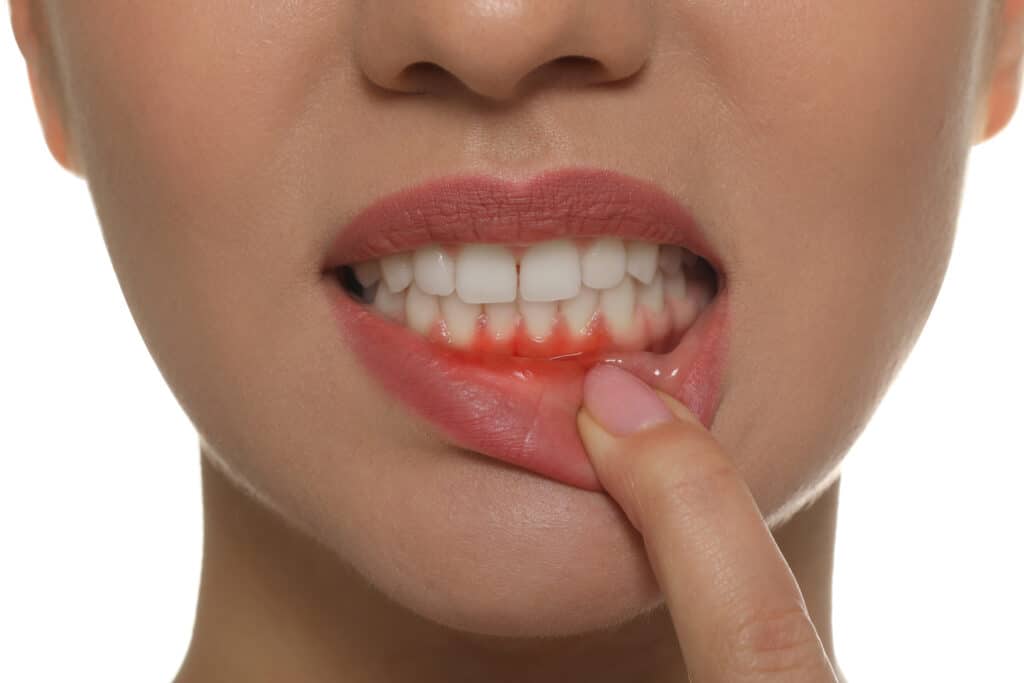Picture this: you typically only brush your teeth in the morning and floss never. However, the day of your dental cleaning arrives, and you floss thoroughly (even though your gums bleed) and brush your teeth for a solid 5-10 minutes in the hopes that it’s enough to fool your dentist into thinking that you take care of your teeth as recommended.
Does this actually work? Or can your dentist still tell if you don’t brush or floss as you should?

Spoiler Alert: Your Dentist Can Tell If You Don’t Brush Or Floss As You Should
Your efforts to disguise the fact that you don’t brush or floss won’t hide this from your dentist. It’s no use trying to lie to your dentist when the state of your mouth snitches on you.
If you struggle to maintain recommended oral health habits, talk to your dentist about it. They’re there to help you, however they can. They don’t want to lecture you any more than you want to be lectured!
Here is what you need to know about why your dentist can tell if you don’t brush or floss as you should.
Dentists Can Read Your Mouth Like A Book
So, don’t even bother trying to lie to them – they’ll know. Dentists can decipher more than if you don’t brush or floss from the state of your mouth.
Dentists can tell:
- How often/how thoroughly you floss
- Whether you don’t brush your teeth enough… or you brush them too much
- If you bite your nails
- If you grind your teeth/clench your jaw often
- If you have potential for diabetes
- If you vape or use tobacco
- If you have dry mouth
- If you sucked your thumb a lot
- If you have oral cancer
- If you have acid reflux
- If you have a sinus infection
- If you drink too much alcohol
- If you drink too much soda or sports drinks
- If you have sleep apnea
- If you have a vitamin deficiency
- If you have an eating disorder
Shocking, isn’t it? All those years of school and experience required to be able to practice as a dentist definitely pay off in how much your dentist can end up being able to help you with.
We’ll go into further detail about why and how your dentist can detect these things below.
How Your Dentist Can Do This

#1. Your Gums
Healthy gums don’t bleed. Your gums are a dead giveaway as to whether or not you brush or floss as you should. If your gums are bright red and/or bleed when you floss, they’re not healthy. You may also have large plaque deposits under your gums – which wouldn’t be there otherwise.
Your gums should be a fleshy pink that doesn’t bleed. Flossing once before your dental cleaning isn’t enough to reverse gum disease – it needs to be a regular habit.
Gum disease can occur simply because you don’t floss or don’t floss enough. It can also be an early indicator for health issues, like diabetes.
#2. Your Teeth
Stained, chipped, or ground-down teeth all give away dental health issues. Plus, if you have dental decay that has progressed far enough, cavities can form visible holes in your tooth enamel. Plaque can build up if you don’t brush or floss as you should. Drinking lots of sodas or sports drinks can cause a specific pattern of wear on your tooth enamel, while alcohol causes you to have decreased saliva production.
If you have an eating disorder, acid reflux, bruxism, you bite your nails, you drink a lot of alcohol or sodas or sports drinks, or you either don’t brush your teeth enough or you brush them too much, your dentist will be able to tell.
#3. Your Mouth As A Whole
Your dentist doesn’t just look at your teeth. They’ll also look for inflammation, sores, lumps, saliva production, the condition of your tongue, tooth formation and alignment, cracked lips, and more.
For instance, if you sucked your thumb a lot as a child, this could have impacted how your teeth aligned. If you have a vitamin deficiency, you may have bleeding gums, a sore tongue, cracked lips, and other such issues. If you have oral cancer, this can show on your tongue and around your mouth.
Do You Need Help Establishing Good Oral Health Habits?

So, your dentist can tell if you don’t brush or floss as you should. If this is you, you’re probably familiar with the questions of how often you’re brushing and flossing. Rather than attempting to lie when your dentist can tell you’re lying, be honest with them. If there’s some reason why you aren’t brushing or flossing as you should, talk to your dentist about it.
For instance, many people don’t floss because it hurts and their gums bleed when they do. As such, you may think flossing is doing more harm than good. Your dentist would likely explain to you that the reason for this is because of gum disease – which is reversible if you take up good flossing habits. However, if left alone, it could escalate into severe gum disease, which can result in you losing your teeth among other problems.
Your dentist wants to help you however they can. Whether it’s just laziness or there’s a legitimate reason why you struggle to brush or floss as you should, don’t be afraid to let your dentist know. Chances are, they’ll be able to provide you with advice to make implementing these habits easier for you.
Attentive Dental Care In Cottonwood Heights
Eric Felt, D.D.S., is here to help you with your dental health. Whether you need a regular dental cleaning, emergency dental care, or restorative dental services, count on us to help you restore your smile and improve your oral health. Contact us today to schedule an appointment or for any questions about our services that you may have.


